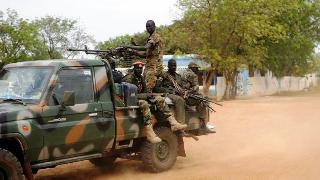South Sudan opposition accuses rebels of killings in Malakal
January 19, 2014 (JUBA) – More than ten prominent traders and medical doctors from the Shilluk ethnic group in Upper Nile state have been killed, according to South Sudan’s largest opposition party.

“There has been a fighting in Malakal for the last three days and people are being killed indiscriminately. The situation has now been complicated by the lack of communication. There is no network there. People are using satellite phones and now we hear there is a targeted killing in town”, Adigo, himself a Shilluk from Upper Nile, said.
Adigo wondered why it appears the fighting between the government and rebels, which has lasted for over a month, has taken on a tribal dimension.
An internal power struggle in the leadership of the governing Sudan People’s Liberation Movement (SPLM) spread into South Sudan’s army (SPLA) on December 15 in Juba and quickly spread to Jonglei, Unity and Upper Nile states, where defectors from the army and ethnic armed groups managed to gain control of some key towns.
Talks in the Ethiopian capital Addis Ababa may see a ceasefire agreement signed over the next few days but already over half a million people have been displaced and over 1,000 – as many as 10,000 by some estimates – people have been killed.
“We are surprised that the fighting has taken tribal dimension. We thought it was a fight between the government and the rebels but now it appears to be taking tribal dimension, killing people who have not indicated any interest to participate in the conflict. The people who have now been killed are just innocent people”, Adigo explained.
House to house killing
Meanwhile James Okuk, a renowned political commentator and lecturer at Juba University told Sudan Tribune that “the situation in Malakal is deteriorating badly.”
“There has been a targeted killing of our people for the last three days now in Malakal town. So far we have information that ten prominent businessmen in the town have been killed. The situation is deteriorating from bad to worse. There has been house to house killing of our people in Malakal and the government and the United Nations Mission in South Sudan are silent up to now, when people are dying”, said Okuk.
The UNMISS compound in Malakal is now home to 22,000 people who fled there to seek shelter from the conflict.
Okuk named Mojwok Nyacik, Aban Yokwan, Agoding Mojwok as being among the more than ten prominent Shilluk traders and medical doctors killed during the alleged house to house killings Malakal town.
“These people were killed in their houses. Others were killed in the hospital beds. Doctors who were nursing them were shot dead. One of the doctors who were in the hospital treating patients was shot. He is now in a critical situation at [the] UNMISS camp in Malakal”, said Okuk.
He says he has received reports from survivors who fled to the UN camp of women being raped.
“It is really a worrying situation. We hear women are being raped and killed. The worse [thing] is that these people follow civilians to the hospital and in the churches where they have gone to seek protection because they are being removed and killed in their houses”, Okuk explained, urging the United Nations to provide protection to such civilians.
The spokesperson for the South Sudanese army, Colonel Philip Aguer, said government troops were still trying their best to ensure that rebels fighting the government in Malakal town are defeated.
“The SPLA forces have been fighting these rebels since Wednesday. Our forces have managed to push them out from most of the areas in the town and it is just a matter of time before we take complete control of the town to rescue these civilians who have fallen prey of the situation”, Aguer said on Sunday.
He did not provide any further details about the ongoing fighting in Upper Nile, which, like Unity state exports, South Sudan’s oil to international markets through neighbouring Sudan.
As the conflict enters its sixth week there is growing concern the other countries in the region will be dragged into fighting. Uganda has already deployed troops to South Sudan to fight alongside the South Sudanese army and Kenya has also sent some soldiers to the capital Juba to help evacuate its citizens.
South Sudan seceded from Sudan in July 2011 after decades of conflict as part of a power sharing deal in 2005.
However, South Sudan’s defence minister has admitted that the young nation may be forced to ask the Sudan Armed Forces to help to help the SPLA secure the oil fields, which mainly lie just south of the new international border if they come under threat from the rebels.
Oil production has already reduced from 240,000 barrels per day to around 200,000 bpd since the fighting spread from the capital to Unity and Upper Nile as many staff from the oil companies operating there have been evacuated.
(ST)
